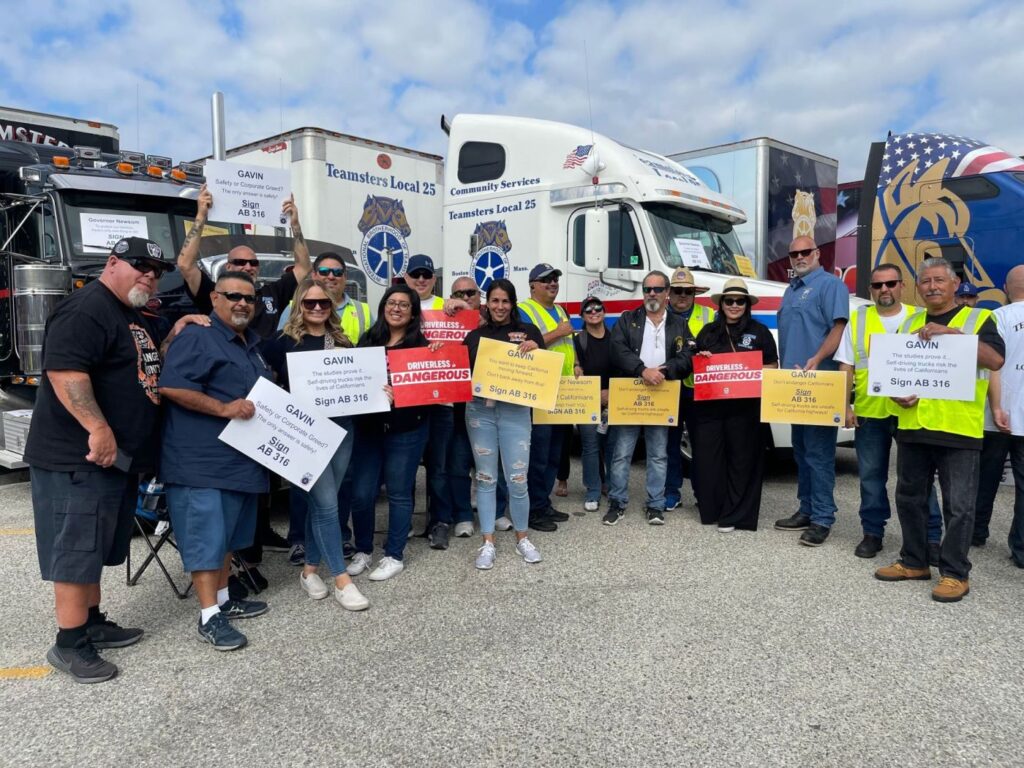
Teamsters and supporters rallied on Monday, Sept. 18 in Arcadia, supporting a Legislative bill that would require a human operator in self-driving vehicles weighing 10,001 pounds or more.
The union says Assembly Bill 316 would prioritize safety on the road and put the preservation of an estimated 200,000 California jobs “before the interests of Big Tech.” Opponents say it would derail the state’s move to deliver safe, lower-cost transportation of goods at a time when the trucking industry is struggling to attract and retain drivers.
Smart Trucking, an online career and support organization for truckers, said many drivers are leaving the industry in search of jobs that offer better pay, benefits and working conditions, a trend that has resulted in a shortage of about 60,000 U.S. drivers.
Smart Trucking added that drivers often get nothing for the time they spend stuck in traffic jams, construction zones, bad weather or other delays they encounter on the road.
SB 316 — which a Teamsters representative said the union has supported through contributions to lobbyists — gained final approval in the Senate last week and is headed to Gov. Gavin Newsom’s desk.
Newsom has expressed skepticism about the legislation.
After Monday’s rally in Arcadia, drivers were headed up to Sacramento for a Tuesday rally and march to the state Capital. (Photo courtesy of the International Brotherhood of Teamsters)
Skepticism in Sacramento
Dee Dee Myers, a senior adviser to the governor, said as much in an Aug. 15 letter to Assemblywoman Cecilia Aguiar-Curry, D-Davis, one of the bill’s primary authors.
“AB 316 takes an inflexible approach to regulating a growing industry borne out of California’s innovation economy,” she wrote. “We believe that it’s critical to lead with consistent values –inclusivity, competitiveness and sustainability.”
Myers said “significant checks and balances” are already in place for self-driving vehicles, including oversight by the California Department of Motor Vehicles, California Public Utilities Commission, Highway Patrol, National Highway Traffic Safety Administration and U.S. Department of Transportation.
“The bill fails to recognize that the federal government and nearly a dozen other states are moving forward with this technology,” Myers said. “And many of those states are actively positioning themselves to lure away California-based companies and the investments and jobs they bring.”
Monday’s gathering, held at a parking lot near Santa Anita Park in Arcadia, drew drivers from several Teamsters locals along with a variety of supporters. Following the rally, they headed up to Sacramento for a Tuesday rally and march to the state Capital.
Autonomous incidents in San Francisco
Jared Hamil, a UPS package driver, fully supports AB 316.
“I just don’t think the technology is there in light of what we’ve seen in San Francisco,” the 36-year-old Los Angeles resident said. “Two cab companies with autonomous cabs have been plagued with accidents that hold up traffic and block emergency vehicles.”
In recent months, autonomous taxis operated by General Motor’s Cruise and Alphabet’s Waymo have stalled on San Francisco streets and collided with objects and vehicles, including first responders.
In one Aug. 17 incident, a fire truck responding to an emergency collided with a self-driving Cruise cab. Investigators said the driverless taxi had the green light but still should have yielded to the emergency vehicle.
“The fire engine was operating in Code 3 emergency mode, with lights and sirens,” San Francisco Police Department spokesperson Sgt. Kathryn Winters told CBS News. “It’s really a reminder to everyone you are required to yield whether it’s a vehicle driven by a human operator or an autonomous vehicle.”
San Francisco leaders asked state regulators to halt the expansion of robo-taxi service in the city.
Kim Roberson, a bus driver for the Orange County Transportation Authority, said an autonomous vehicle wouldn’t be able to provide assistance for someone experiencing a medical emergency, and it wouldn’t alert the fire department if it passed a burning home.
“I think it’s like autopilot on an airplane,” she said. “You still need to have a person sitting there if something comes up.”
